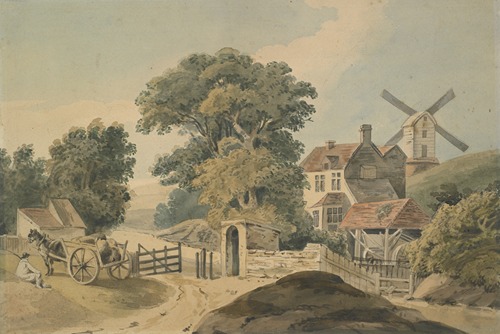Sir Richard Neave
Sir Richard Digby Neave, 3rd Baronet, usually known as Digby Neave, was an English artist and author.
He was the eldest son of Sir Thomas Neave, 2nd Baronet, and brother of Sheffield Neave. He was educated at St Mary's Hall, Oxford, graduating in 1815. He later described Edward Penrhyn as a travelling companion of the years 1817–8.
Neave became Steward of the Liberty of Havering-atte-Bower in 1821.
Related by marriage to Abel Rous Dottin—Neave's father-in-law was Dottin's brother-in-law—he attended the initial meeting for the London and Greenwich Railway in October 1831. It took place in Dottin's house at 31 Argyle Street, London. Neave became one of the railway company's directors, resigning on 26 November 1836. He was then involved also, as of 1837, in the Dover Railway Company and New Gravesend Railway Company.
Neave acted as the first Assistant Poor Law Commissioner, in the Chester area, from January 1836. He was then described as a Justice of the Peace, of Havering atte Bower, Essex. He owed his appointment to the recommendation of "E. Penhryn", writing to John Shaw-Lefevre. This person has been identified as the future Edward Douglas-Pennant, 1st Baron Penrhyn, but possibly was his friend Edward Penhryn, a barrister. Another recommendation was from Sir Charles Trevelyan, a cousin, who let it be known that the appointment would please him.
As mentor, Neave had Edward Gulson. They had a meeting in February 1836 at Clumber, with Henry Pelham-Clinton, 4th Duke of Newcastle. Another meeting to deal with Nottinghamshire Poor Law union issues, in the context of local politics and personalities, was with Robert Lowe at Bingham.
Edwin Chadwick sought material with which to advocate against the Cheshire Constabulary, set up in 1829, and Neave supplied it. The 1837 general election caused local resistance in Cheshire to poor law reform, which Neave characterised as "backsliding". In implementing the Poor Law Amendment Act 1834, he failed to reform the Chester workhouse, which continued on the old basis to the 1860s.
Neave was a friend of John Constable, visiting his London studio on 21 May 1819. In 1825 Constable painted portraits of Neave and his brother Sheffield. In the same year, Neave became godfather to Constable's daughter Emily. Constable stayed with him at Epsom; this was at Pitt Place, which at that date, 1831, was leased by Neave from Rowland Stephenson. He and family members later bought it at auction, in 1840.
A book from 1841 described Pitt Place as Neave's seat. He became the third baronet, on his father's death in 1848. He later resided at Dagnam Park, Romford, Essex. In 1861 he was elected a member of the Royal Geographical Society.
